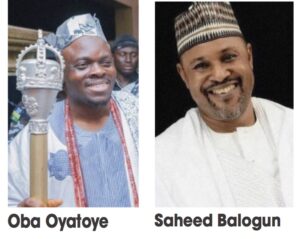By Lukman Olabiyi
In the heart of Lagos, a powerful call to action echoed during the eighth edition of the Asa Day Festival.


The theme, “Raising the Bar of Lagos Indigenous Cultural Heritage,” resonated deeply with attendees, urging them to recognise the immense economic potential embedded in Nigeria’s rich cultural traditions.
Asa Day, which has been celebrated for years in Canada, made its way to Lagos, for the second time since its inception. This year’s gathering was an immersive showcase of Yoruba tradition, with performances, art, music and dance that spoke to the heart of the culture.

The event, held in Agidingbi, Ikeja, in collaboration with Asa Day Worldwide International Canada and the Lagos State Ministry of Tourism, Art and Culture, highlighted a growing movement to preserve and promote Yoruba culture.
The event was not just a celebration but a declaration of the value and importance of Yoruba culture as an economic driver.
The Nigerian government, at both state and national levels, was urged to take more active steps in harnessing culture as a means to bolster the economy.
The support from the Lagos State Government in hosting this year’s edition was widely acknowledged, with promises to make the next edition even more elaborate, featuring a comprehensive exhibition that will further underscore the importance of cultural heritage in contemporary society.
Leading the charge was Oba Joel Olaniyi Oyatoye, the Oloro of Oro Kingdom, Kwara State, a passionate cultural advocate, who has dedicated his life to safeguarding the heritage of his people.
“I am a cultural ambassador and a custodian of our traditions,” Oba Oyatoye said, speaking with a fervor that matched the festival’s mission.
“I believe that our future lies in our culture, and through it, we can develop our economy,” Oba Oyatoye said.
The monarch’s words were more than just rhetoric; they were a call to action for individuals, communities, and governments to look within and explore the untapped economic opportunities rooted in cultural heritage.
Despite the overwhelming influence of Western culture, there is a growing realization among Nigerians of the need to preserve their indigenous traditions.
The festival served as a testament to the increasing value people are placing on their roots.
Oyatoye, who founded Asa Day, explained that while civilization has led to the erosion of cultural practices in some areas, there is a noticeable shift.
“People are now celebrating our culture and looking for ways to incorporate it into our economy,” he noted.
The significance of the festival was not lost on those who attended. The Asa Day celebration is not just about honouring culture; it’s about using it as a springboard for economic growth. One of the key aspects of the festival’s success is its ability to bridge the gap between cultural preservation and economic opportunity.
By raising awareness of indigenous traditions, Asa Day is drawing attention to the potential for cultural tourism, arts, crafts, and even local cuisine to contribute to economic development.
Lagos State, with its vibrant and diverse population, was a fitting location for this year’s festival.
Oyatoye pointed out the importance of recognizing Lagos as not just a melting pot of different cultures, but also a place where indigenous traditions deserve to be celebrated and promoted.
“Every race and kingdom has its own culture, and it’s time for Lagos to raise the flag of its indigenous heritage. We want the world to know that Lagosians have a culture worth recognizing”, he said.
The event brought together people from far and wide, with visitors coming from neighboring states and even as far as China. For them, the festival was more than a celebration; it was an opportunity to engage with and invest in Nigeria’s cultural economy.
“This is a new frontier for tourism. People are eager to learn about and experience Lagosian culture,” Oyatoye remarked.
The economic potential of cultural initiatives like Asa Day was echoed by other notable figures at the event.
Fuji maestro, Dr. Saheed Osupa, praised the initiative, emphasizing that preserving culture is not just about nostalgia, but about securing the future. “It’s vital that we don’t let our culture fade away, this collaboration between the royal family and the government is a great step forward,” Oyatoye remarked.
Similarly, Yoruba Nollywood actor, Saidi Balogun, spoke passionately about the importance of teaching younger generations about their heritage.
“It starts with us,” he said, urging parents to instill an appreciation of Yoruba culture in their children.
“If we don’t teach them, who will?” he asked
Mrs. Lanre Hassan, known as Iya Awero, a respected figure in Yoruba cultural circles, echoed the sentiment.
She called on cultural enthusiasts to take an active role in ensuring that the next generation understands and values their heritage.
“We must hand down our traditions to our children, so they know who they are and where they come from,” she said.
The collaboration between the government and royal institutions like the Oloro of Oro Kingdom is proving to be a powerful model for cultural preservation and economic growth. By promoting local culture through festivals like Asa Day, Lagos and Nigeria at large are beginning to recognise the vast potential of their heritage as a driver of economic progress.
As the festival concluded, one thing was clear: the movement to celebrate, protect, and promote Yoruba culture is more than a celebration of the past, it’s a pathway to economic transformation.
The energy and passion of Oba Oyatoye and other cultural ambassadors have made it evident that Yoruba heritage is not just a matter of pride, but a resource capable of shaping the future.
The next Asa Day promises to be even bigger, with plans for a comprehensive exhibition that will further showcase the importance of cultural preservation in a modern world.
As Nigeria continues to face economic challenges, it’s clear that embracing and leveraging culture can provide new avenues for growth and development.

